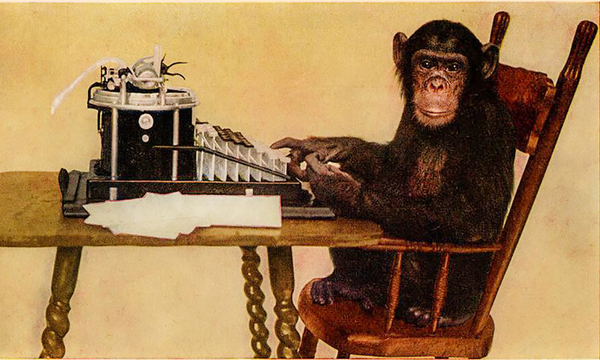Jack Wilson had always enjoyed being in the open air where he could stretch his lungs and move his twenty-five year-old limbs freely. Today, however, Jack imagined he was in the fourteenth century while he pedaled the five miles to his school when a brown Buick slammed into his bicycle from behind. The impact threw him ten feet towards the gutter where he pulled his face to his knees and protectively clutched his head, unaware of the blood. Then Jack was out.
Blurry images filled his vision when he woke. The swishing sounds of nurses moving swiftly in and out of doorways, the antiseptic fumes, and the cold, fluorescent lighting told him that he was in a hospital. Nobody told him what his damages were; the nurses only smiled and ignored him when he tried to speak. Jack's hope collapsed.
After three months of therapy, Jack regained many of his basic motor skills. Speech came back to him quickly, but reading and writing eluded him. Specialists directed him in crawling on the floor, tracing letters in sand, and listening to tapes of children's books. Phonics seemed more complicated than chemistry. Jack began to despair of ever reading and writing again.Â
Before the accident, Jack had recognized the importance and value of reading the Bible. He knew that God's revealed truth was there, available to him for as long as he liked. For Jack, the Bible was important as a master link in the chain of history; God seemed to hold all the chaos of man's events in a kind of flow and purpose. Now, illiteracy barred him from his easy access to that master link. Without it, the chain seemed futile.
Against the well-meaning advice of Sarah, a friend and reading specialist, Jack applied his emerging reading ability to decoding the Scripture. For the first month, each word in Genesis challenged him. If he relaxed his concentration for a moment's relief, the few familiar black marks returned to swim among the others in the square, white sea. Reviewing the few rules that seemed most useful to him as he practiced regularly, Jack soon began to recognize some words without having to confirm them in the dictionary. Small, frequently occurring words became his friends, names stood out, and—to his great excitement—stories began to emerge.Â
Now that Jack was more competent to read whole chapters at one sitting, his memory of the narratives served him to follow the story flow, predict the meanings of unintelligible words, and quickly recall his expanding vocabulary. Despite his struggles, Jack saw things in the Scriptures that his formerly quick-reading eyes had missed. In reading slowly to decode each word in turn, Jack noticed arrangements of words and repetition that seemed to indicate an emphasis of theme. He encountered familiar phrases as comforts; formerly these repetitions had annoyed him and made the writing seem childish, simplistic, and obvious.Â
Because he labored to attack each word as a separate battle and then tried to make sense of whole sentences and paragraphs, Jack often paused at the end of a section for relief. In these moments of rest, he also reflected on a particular word or the implications of the meaning. When before the text had seemed a mosh of information, Jack now saw individual threads that wound and knotted to reveal a glowing tapestry expressing coherence, brilliance, and inspired truth.
Text that had always seemed to be trite oral tradition now implied practical theology. In Genesis, Jack began to learn new things about God as an almighty Creator who is the sole authority over His creatures. The Creator's ongoing involvement to achieve His purposes showed in His judging of humanity in the flood, disrupting the foolishness at Babel and dispersing the rebels so they would behave properly as creatures, and befriending Abraham. For Jack, Yahweh seemed not only the sole option for worship; Yahweh also confirmed His reliability for Jack's total trust. These models of faith showed in the narratives about Abel's obedience, Abraham's trust, and Jacob's persistence. Jack realized that his own obedience, trust, and persistence needed the enthusiasm that Scripture provided for him.Â
On the other hand, personal discipline and a belief in his own effort had always been adequate to accomplish Jack's basic expectations in life. While reading with careful slowness, Jack saw that God's will for him was to trust Sovereign maneuvering and instructions instead of persisting in the finitude of his own abilities. Jack began to understand the degree of his accountability to God. No longer did he see his life as something he had the opportunity to inhabit primarily for his own benefit; he perceived that the Creator's purpose must inhabit Jack's life. Jack found himself as if he stood at the edge of a cliff, like Jacob at the Jabbok. He received surrender as a gift, and Jack's diminished self-assessment limped with the assurance of a more substantial relationship with Yahweh. Jack was now desperately willing to trust his Creator more than ever before.
Friends noticed the changes in Jack's demeanor as months passed by. Some had expected that the trauma would shake him, so Jack's new fidelity to the Scripture did not surprise them. Others lamented Jack's disabilities. They watched him walk with a foot dragging slightly, they empathized with his loss of ability to ride his bicycle, and it pained them to watch him read the Bible so slowly. Intending good, they bought him the audio cassettes of some actor reading the text aloud. Jack politely explained that he had no interest in listening to Scripture now that he could read it for himself—even if his laborious decoding didn't seem like reading to fluent readers. "I see so much more this way," Jack said to them, "it's as if I'm reading the Bible for the first time."  Reading the Scriptures slowly became one of the greatest gifts in his life.
Years later, Jack was able to take a class in his church on reading biblical Hebrew. The enthusiastic teacher urged Jack and the others to memorize paradigms and vocabulary, assuring them that these hard things would pay off soon. And it did. Once Jack was able to begin decoding the first chapters of Genesis in Hebrew, he felt like it was déjà vu. To his delight, Jack got to enjoy reading the Bible for the first time all over again, here in the ancient language. As before when he’d had to re-learn to read, each word of Hebrew was precious. He was drawn into meditation, and he listened for God’s voice, one word at a time. It was a gift to read it this way too.
 51ÂÜÀò
51ÂÜÀò


.jpg)
